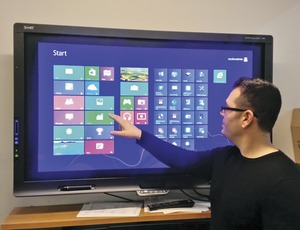
Microsoft's rolling release of its new Windows 8 operating system, along with its companion Surface touch-screen tablets to run it, is being greeted by construction IT managers like a beast with a split personality—but with great potential to liberate data.
For some qualities—specifically, the ability to run Windows applications while using Microsoft's DirectAccess server to make secure, effortless connections through firewalls, along with Surface's battery life that is far longer than laptops—they love it. But for in-office upgrades, they say they would rather not go there, as the new user interface is counter-intuitive, making for a difficult to transition.
Although mobile devices such as iPads and Android tablets have brought valuable computing power to jobsites, Jason Burns, vice president of technology at New York City-based Hunter Roberts Construction, says the drawback is that users can't run Windows programs on such devices and IT managers can't easily tie those devices into a firm's enterprise network system. That leaves frustrated users resorting to software approximations of their office tools and wading through thickets of log-in screens to make a connection.
"Our superintendents will go mad if I install apps that make their lives more difficult," says Burns. "You need Windows token [access] management, and only Windows has it."
Other Windows 8 beta testers at PCL Constructors, Edmonton, Alberta, Canada, agree. Shane Crawford, PCL's manager for infrastructure, say Windows' DirectAccess tool gives both Windows 7 and 8 a decisive advantage for enterprise users over other available systems. "No user intervention or activity is required to establish the connection to the company's infrastructure," says Crawford. Once the tablet or a compatible device has an internet connection, the DirectAccess service automatically connects to the corporate DirectAccess server. Then, users interact with their system exactly as if they were in the office using a typical desktop computer.
Even though Windows 8 RT and Windows 8 Pro are out, only the first-generation Surface RT tablets are available; thus, the direct connectivity and power will not be delivered until the release of the enterprise-grade Surface Pro, which Mary Jo Foley, editor of ZDNet's All About Microsoft blog, says is promised for late January. When that happens, Burns and Crawford agree that unleashing the Windows tool sets on touch-screen tablet PCs will be so compelling that issuing and supporting desktop or laptop computers for users may no longer be necessary. Mobile devices will do.


Post a comment to this article
Report Abusive Comment